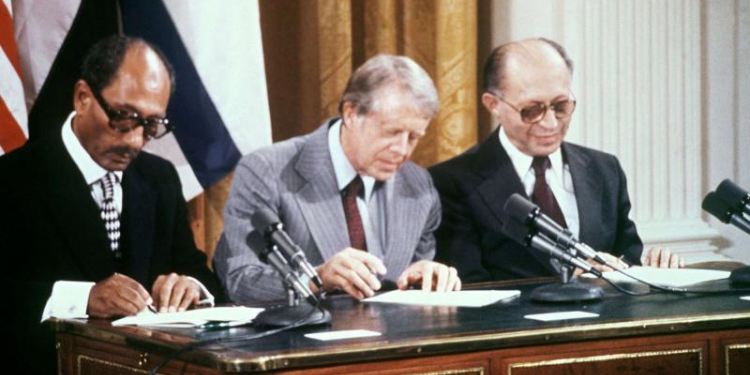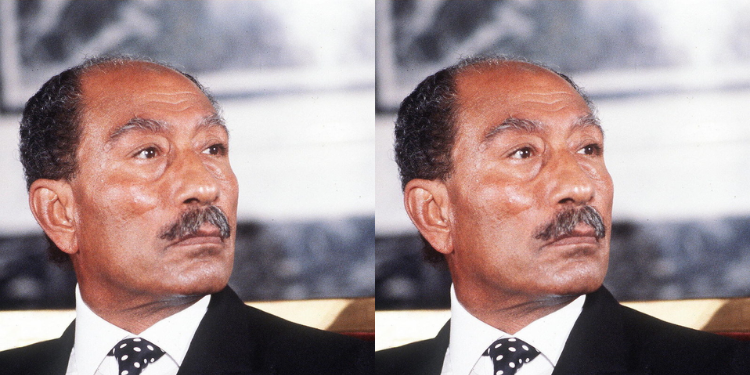On October 6, 1981, the President of Egypt, Anwar Sadat, was assassinated in Cairo while inspecting a military parade.
At the time of the assassination, Egypt was commemorating the 1973 Yom Kippur War, a conflict fought from October 6 to October 25, 1973, between Israel and a coalition of Arab states led by Egypt and Syria.
During that war, Egyptian forces famously crossed the Suez Canal in a surprise attack to reclaim territory lost to Israel in the 1967 Six-Day War.
The assassination was carried out by a small group of soldiers within the Egyptian army, who were aligned with the radical Islamist group Egyptian Islamic Jihad. The attackers, led by Lieutenant Khalid Islambouli, were low-ranking officers and conscripts who opposed Sadat’s policies, especially his efforts toward peace with Israel.
Anwar Sadat Dies After Suffering Gunshot Wounds
During the parade, the assassins broke from their procession, opened fire, and threw grenades at the presidential reviewing stand. Sadat and 11 others were killed in the attack.
Once the area was secured, Sadat was transported to a nearby military hospital. However, he had already sustained critical injuries, including multiple gunshot wounds to the chest, neck, and limbs. Despite emergency efforts, he was pronounced dead a few hours later.
Before his assassination, Sadat had taken a bold step by leading Egypt to make peace with Israel, marking a major change in the region’s politics.
In October 1973, Sadat and Syria launched a surprise attack on Israel to take back the Sinai Peninsula, which Egypt had lost in 1967. Although Israel eventually pushed them back, many Egyptians saw the war as a symbolic win that restored national pride and gave Sadat an advantage in future negotiations.
In November 1977, Sadat made a historic and unexpected visit to Israel, becoming the first Arab leader to do so. He addressed the Israeli Knesset (parliament), offering peace in exchange for the return of the Sinai Peninsula.
Sadat’s Peace Deal with Israel criticized
This diplomatic move led to the Camp David talks in September 1978, where Sadat, Israeli Prime Minister Menachem Begin, and U.S. President Jimmy Carter met in Maryland, USA. After nearly two weeks, they arrived at a peace agreement.
On March 26, 1979, Egypt officially signed the Egypt–Israel Peace Treaty, becoming the first Arab country to recognize Israel. In return, Israel agreed to withdraw completely from the Sinai Peninsula.
Also Read: Today in History: Samora Machel Dies in a Plane Crash After a Meeting in Zambia
Sadat’s peace efforts were praised internationally but were deeply controversial across the Arab world. Many Arab states and leaders viewed the treaty as a betrayal of the Palestinian cause, and in 1979, Egypt was suspended from the Arab League.
At home, Sadat faced growing opposition from Islamist groups, who condemned his recognition of Israel and close ties with the West. His crackdown on dissenting voices further heightened tensions within Egypt.
This mounting domestic and regional hostility, particularly from Islamist extremists, culminated in Sadat’s assassination in 1981 by members of Egyptian Islamic Jihad, who viewed him as a traitor to Islam and the Arab cause.
Follow our WhatsApp Channel and X Account for real-time news updates.


![Court Suspends Sections Of The Computer Misuse And Cybercrimes Act President Ruto Address During Mashujaa Day And How He Honored Raila [Full Text Speech]](https://thekenyatimescdn-ese7d3e7ghdnbfa9.z01.azurefd.net/prodimages/uploads/2025/10/ruto-mashujaa-address-360x180.jpg)







































































![Court Suspends Sections Of The Computer Misuse And Cybercrimes Act President Ruto Address During Mashujaa Day And How He Honored Raila [Full Text Speech]](https://thekenyatimescdn-ese7d3e7ghdnbfa9.z01.azurefd.net/prodimages/uploads/2025/10/ruto-mashujaa-address-120x86.jpg)


